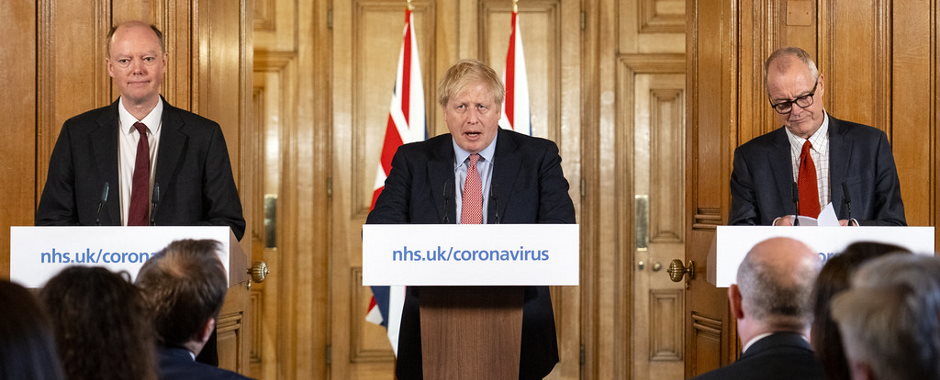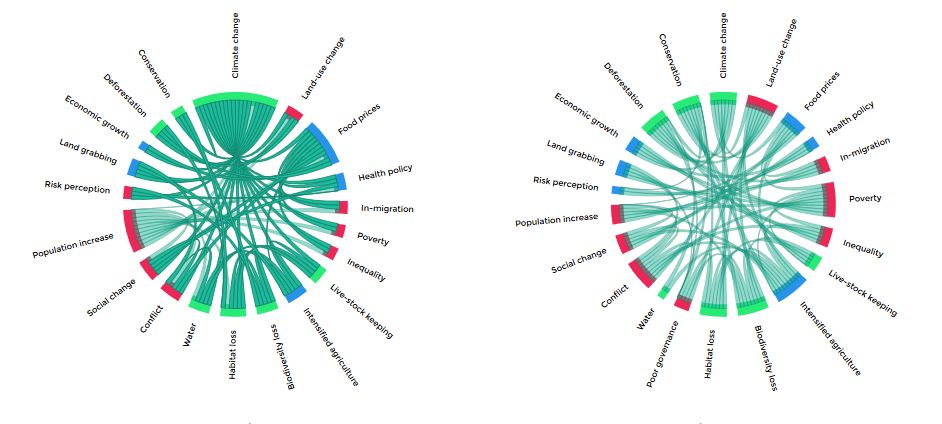A selection from 13 years of work in the ESRC STEPS Centre explores how people prepare for, and respond to, widespread outbreaks of disease.
The scale and spread of the COVID-19 novel coronavirus is unfamiliar. But there are many lessons from past experiences in how governments prepare (or fail to prepare) for pandemics, how societies respond to disease, the links between ecology and society, and how to make sense of uncertainties in science, policy making and everyday life.
1. Science, uncertainty and policy advice

Science of many kinds is a vital source of insight to shape policy and practice during epidemics. But perhaps more than any crisis in the recent past, COVID-19 shows the many ways that science advice can be controversial in a fast-changing, uncertain situation with conflicting views. As past examples show, opening up science advice to scrutiny and participation can be challenging but useful in seeking alternative ways forward.
BLOG: Science, uncertainty and the COVID-19 response
Ian Scoones, 16 March 2020
BLOG: Post-normal pandemics: Why COVID-19 requires a new approach to science
David Waltner-Toews, Annibale Biggeri, Bruna De Marchi, Silvio Funtowicz, Mario Giampietro, Martin O’Connor, Jerome R. Ravetz, Andrea Saltelli and Jeroen P. van der Sluijs, 25 March 2020
BLOG: Modernity without its clothes: the pandemic crisis shines a light on the futilities of control
Andy Stirling, 7 April 2020
BLOG: COVID-19, science and governance: lessons from India
Dinesh Abrol, Ritu Priya and Pravin Kushwaha, 1 May 2020
RESOURCES: Credibility Across Cultures
A selection of short filmed presentations and downloads from our 2013 symposium on the global politics of scientific advice.
JOURNAL ARTICLE: The social and political lives of zoonotic disease models: narratives, science and policy
Leach, M. and Scoones, I. (2013) Social Science and Medicine
JOURNAL ARTICLE: Keep it Complex
In this Nature article from 2010, STEPS co-director Andy Stirling argues that scientific advice should acknowledge uncertainty and avoid closing down to single ‘definitive’ answers where none are possible.
JOURNAL ARTICLE: Post-pandemic transformations: How and why Covid-19 requires us to rethink development
World Development article (2020) by Melissa Leach, Hayley MacGregor, Ian Scoones and Annie Wilkinson reflecting on the challenges that Covid-19 reveals for future transformations in science advice, economies and citizen-state relations.
2. Understanding epidemics and pandemics

Epidemics have a complex and challenging life in society. Viral outbreaks bring together many different kinds of moving parts: viruses themselves, animals and people, health systems, food and transport, mutual support and livelihoods – and the many different everyday practices, conditions and ways of life that can make people more vulnerable or slow the spread of disease.
There are many places where state support is very limited, society is deeply unequal, and where social relations and livelihoods are fragile and vulnerable. Learning from local practices, building resilience from below, is essential for shaping the COVID-19 response.
Work on the ‘social life’ of epidemics has been central to STEPS Centre work since 2007, when research on the response to avian influenza in Southeast Asia began. This work has continued with research on swine flu and other zoonoses, and the 2014 Ebola outbreak in West Africa (see this account of how our work on this theme progressed over time).
Our resources show the importance of social factors like the role of narratives in shaping action, the legitimacy of different kinds of authority and power, the impacts of deep-rooted inequality, diets and trade in animals, cultural traditions like burial and healthcare practices, and the difficulties of linking up global coordination and local action.
Podcast
PODCAST: The Social Dynamics of Pandemics
Between the Lines podcast, Institute of Development Studies, April 2020
In an episode recorded in response to the COVID-19 outbreak, this discussion between Ian Scoones, Melissa Leach, Hayley MacGregor and Annie Wilkinson explores lessons from the past for the current outbreak.
Comment pieces
BLOG: Living with coronavirus uncertainties: four lessons from pastoralists
Ian Scoones, 27 March 2020 (PASTRES blog)
BLOG: Surviving COVID-19 in a fragile state: why social resilience is essential
Ian Scoones, 27 March 2020 (African Arguments)
BLOG: Responses to Covid-19 must focus on communities and not just past epidemics
Jeremy Allouche and Dieunedort Wandji, 6 April 2020 (Africa at LSE blog)
BLOG: The Covid-19 pandemic shows how power produces poverty
Saurabh Arora and Divya Sharma, 28 April 2020
BLOG: Five lessons from past global influenza outbreaks for COVID-19
Ian Scoones, 30 April 2020
COMMENT: The lessons of swine flu
Ian Scoones, The Guardian, 2009
Books
BOOK: Avian Influenza: Science, Policy and Politics (download a free sample chapter, or buy the book at half-price – use the discount code IDS50 until May 2020)
Edited by Ian Scoones
BOOK: Epidemics: Science, Governance and Social Justice (download a free sample chapter, or buy the book at half-price – use the discount code IDS50 until May 2020)
Edited by Sarah Dry and Melissa Leach
FREEBOOK: Pathways to Health and Sustainability
(compilation of book chapters, free download)
STEPS Working papers
The International Response to Highly Pathogenic Avian Influenza: Science, Policy and Politics
Ian Scoones and Paul Forster, 2008
Haemorrhagic Fevers in Africa: Narratives, Politics and Pathways of Disease and Response
Melissa Leach, 2008
Epidemics for all? Governing Health in a Global Age
Sarah Dry, 2008
Cambodia’s Victim Zero: Global and National Responses to Highly Pathogenic Avian Influenza
Sophal Ear, 2009
To Pandemic or Not? Reconfiguring Global Responses to Influenza
Paul Forster, 2013
Journal articles
Governing epidemics in an age of complexity: Narratives, politics and pathways to sustainability
Stirling, A.C., Scoones, I. and Leach, M. (2007), Global Environmental Change
From Risk Assessment to Knowledge Mapping: Science, Precaution, and Participation in Disease Ecology
Stirling, A.C, and Scoones, I. (2009), Ecology and Society
Ebola: myths, realities and structural violence
Wilkinson, A. and Leach, M. (2014), African Affairs
Engaging ‘communities’: anthropological insights from the West African Ebola epidemic
Wilkinson, A., Parker, M., Martineau, F. and Leach, M. (2017), Philosophical Transactions of the Royal Society B
Pandemic Flu Controversies
A workshop in 2013 co-hosted by the STEPS Centre and the Centre for Global Health Policy, University of Sussex, this event brought together experts in global health policy with experience of preparing for and dealing with disease outbreaks.
REPORT: Pandemic Flu Controversies: What have we learned? Reflections from a workshop to discuss lessons, policy implications and future challenges
Ian Scoones, Melissa Leach and Stefan Elbe, 2013
COMMENT: Pandemic Flu Controversies: What have we learned?
Ian Scoones, January 2013
VIDEO: Pandemic Flu Controversies
Playlist of short comments from expert researchers at the workshop
3. Zoonoses: drivers of disease

Most human disease outbreaks originate in animals – so-called ‘zoonotic’ diseases. This is the case with COVID-19, SARS, avian flu, swine flu and Ebola. Collaborative work on the drivers of zoonotic disease in Africa has been central to the STEPS Centre’s work.
From 2012 to 2016, the Dynamic Drivers of Disease in Africa consortium (DDDAC) studied the relationships between ecosystems, zoonoses, health and wellbeing, through research in five African countries on four zoonotic diseases (see this multimedia story on how the programme worked). This includes looking at the political economy of research and action on zoonoses – the motivations and power that shape the decisions about what to fund, which questions to ask and how people respond to emerging diseases.
The Dynamic Drivers programme produced an open access special issue of the Philosophical Transactions of the Royal Society B, ‘One Health for a Changing World: zoonoses, ecosystems and human well-being’, in 2017.
Articles from the issue:
- One Health for a changing world: new perspectives from Africa
- Local disease–ecosystem–livelihood dynamics: reflections from comparative case studies in Africa
- One Health contributions towards more effective and equitable approaches to health in low- and middle-income countries
- Poor livestock keepers: ecosystem–poverty–health interactions
- One Health, emerging infectious diseases and wildlife: two decades of progress?
- Views from many worlds: unsettling categories in interdisciplinary research on endemic zoonotic diseases
- Facility-based surveillance for emerging infectious diseases; diagnostic practices in rural West African hospital settings: observations from Ghana
- Structural drivers of vulnerability to zoonotic disease in Africa
- Integrative modelling for One Health: pattern, process and participation
- Spatial, seasonal and climatic predictive models of Rift Valley fever disease across Africa
- Zoonoses, One Health and complexity: wicked problems and constructive conflict
- Engaging research with policy and action: what are the challenges of responding to zoonotic disease in Africa?
Other publications
BOOK: One Health: Science, Politics and Zoonotic Disease in Africa (download a free sample chapter, or buy the book at half-price – use the discount code IDS50 until May 2020) edited by Kevin Bardosh
JOURNAL ARTICLE: Zoonotic diseases: who gets sick, and why? Explorations from Africa
Vupenyu Dzingirai, Bernard Bett, Sally Bukachi, Elaine Lawson, Lindiwe Mangwanya, Ian Scoones, Linda Waldman, Annie Wilkinson, Melissa Leach and Tom Winnebah (2016) Critical Public Health
JOURNAL ARTICLE: The social and political lives of zoonotic disease models: Narratives, science and policy
Leach, M. and Scoones, I. (2013) Social Science & Medicine
RESOURCES: One Health and the Real World
Video, slides and commentary from an international symposium organised by the Dynamic Drivers of Disease in Africa programme
WEBSITE: Disease Scenarios Africa
Interactive maps showing how multiple drivers of disease affect each other in different countries, plus a set of possible storylines on possible futures for disease in Africa, under different conditions.
Other resources
- Social Science in Humanitarian Action – updates on the novel COVID-19 outbreak
A roundup of recent social science on COVID-19, part of a website with wider resources on evidence for disasters and emergencies. - The Epidemic Response Anthropology Platform
Showcases evidence from anthropologists and other social scientists around the world to provide insight, analysis and advice, to inform epidemic response efforts. - COVID-19 – the social science response to the pandemic
Growing round-up of resources, links and responses from the Institute of Development Studies.
Updates from the STEPS Centre
For updates on this theme and our other work, sign up to our newsletter, or follow us on Twitter or Facebook.
Our theme for 2020: Natures
 Nature is all around us, but there are many ways of seeing different kinds of ‘natures’, and many efforts to involve it in forms of control or domination.
Nature is all around us, but there are many ways of seeing different kinds of ‘natures’, and many efforts to involve it in forms of control or domination.
How is talk of crisis shaping nature and people’s views of it? How can colonial forms of knowledge, technology and power be challenged, and what might it mean to ‘decolonize’ the study of environmental change? What do alternatives look like, and how can we explore, nurture, imagine and live the relationships we might want for the future?
Find out more about our theme for 2020 on our Natures theme page.